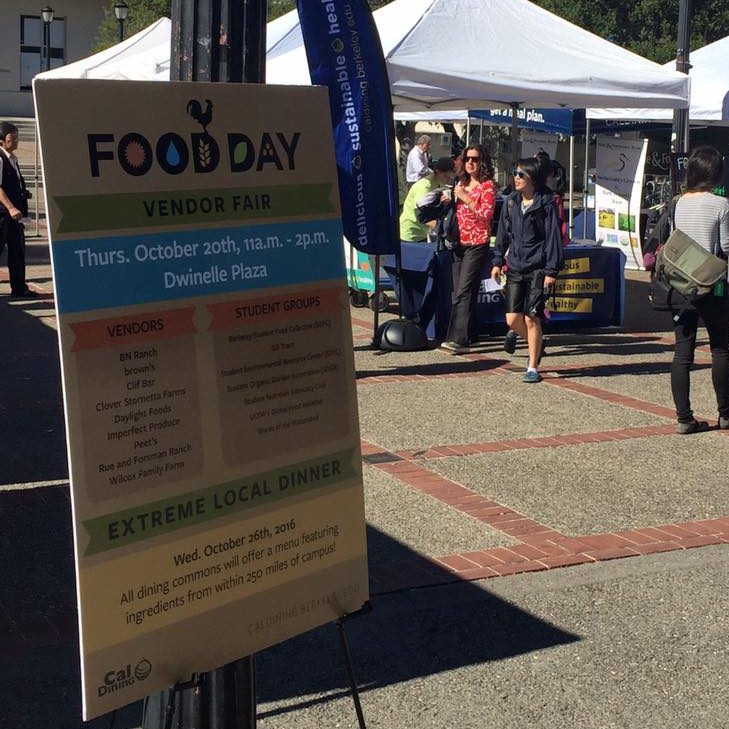Dining Hall Nutrition
 From the loss of chicken tenders at Golden Bear Café, to the reduction of meat at Café 3, Cal Dining has undergone a drastic makeover in the past several years. UC Berkeley has increasingly taken steps towards creating healthy, tasty menus for students as well as developing more sustainable options.
From the loss of chicken tenders at Golden Bear Café, to the reduction of meat at Café 3, Cal Dining has undergone a drastic makeover in the past several years. UC Berkeley has increasingly taken steps towards creating healthy, tasty menus for students as well as developing more sustainable options.
Thousands of students rely on Cal Dining services every day. Over 11,000 students currently have a meal plan, and on a peak day, up to 32,000 meals are served. In addition to the four residential dining halls, UC Berkeley currently operates seven on-campus food venues: Golden Bear Café, Brown’s, Qualcomm Café, Ramona’s, Terrace Café, Common Grounds, and the Pro Shop. Cal Dining also runs concessions at Memorial Stadium and Haas Pavilion, and offers catering service to campus events. There are 14 restaurants on campus that are operated by third party contractors.
In 2014, UC Berkeley began to make efforts to revamp food and beverage options on campus, moving towards healthier, more sustainable options. The school has joined the Menus of Change initiative, which aims to integrate nutrition, environmental sustainability, and social responsibility to food service around the country. The initiative was established nearly five years ago as a partnership between the Culinary Institute of America and the Harvard T.H. Chan School of Public Health. Plant-forward dining, health, and sustainability act as the foundation of the initiative, and guide the operations of participating organizations.
UC Berkeley has specifically pledged to be transparent in their menu, to use only fresh and sustainable ingredients, cook with high quality meat, and serve whole, minimally processed food.
Cal Dining is currently working on making nutritional information more easier accessible to students. In a partnership with Under Armour and their fitness tracking app MyFitnessPal, students can directly log the meals they eat at Cal Dining locations. Cal Dining is also in the process of developing a program for their website that will allow students to count the total amount of metrics such as calories, fat, and sodium that they consume in a meal. Nutritional information for individual dishes can already be found online, and efforts are being made to ensure that posted information is accurate.
As part of their shift towards sustainable food, Cal Dining sources from local businesses such as BN Ranch, Mary’s Chicken, and Wilcox Family Farm. All produce served on campus is only sourced from farms within 250 miles of the Bay Area.

The Eat Well Berkeley program was launched by University Health Services in conjunction with the integration of the Menus of Change initiative. According to the program’s website, it aims to “identify and promote healthier food options throughout the UC Berkeley campus and campus community to support UC Berkeley students, staff, faculty, and visitors.” Restaurants such as Café Zeb, FIFO Haas Café, the Free Speech Movement Café, I-House Café, Brown’s California Café, and Qualcomm Café are all taking part in the Eat Well program, and have pledged to provide healthier dining. The Berkeley Student Food Collective, an off-campus market location, has also joined the program and is working with the university to provide students with accessible healthy food options. Vending machines have been revamped such that at least half of the snacks comply with Canteen’s Choice Plus nutrition standards, and are marked with an identifier, typically in the form of a sticker, for easy recognition by the campus community.
The Eat Well Berkeley program extends past just food options, including initiatives that promote water consumption and nutritional health education.
Dining options at Berkeley will continue to evolve over the next several years, and students can expect to see an increase in fresh, sustainable dining options. Cal Dining is working with a Residential Hall Association focus group and student organizations such as the Jewish and Muslim Student associations and Humane Society in order to ensure that all students’ dietary needs are being met. Cal Dining partners with the College of Natural Resources and School of Public Health to ensure that sustainability and nutritional goals are met on campus. Programs run by University Health Services, the Tang Center, Cal Dining, and the RSF all aim towards bettering the health and health education of students on campus.
Cal Dining welcomes student input on menu changes. In the past, students have been invited to participate in a Dining Committee or work on sustainability projects with Cal Dining. They monitor student food consumption data and adjust menus accordingly, and Cal Dining staff regularly reply to student emails, and welcome students who have concerns about their meal options to meet with them.
